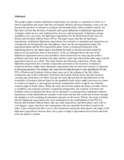| dc.description.abstract | This project paper examines diplomatic negotiations of economic co-operation in Africa as a kind of negotiation and argues that they are equally difficult and keep changing as they not only beyond the questions of national sovereignty and internal affairs which countries cherish, but they balso involve the diversity of interests and a great imbalance in diplomatic negotiation :strategies which are not only traditional but also new and institutional. It illustrates certain .hypotheses in a case study, the diplomatic negotiations for the Preferential Trade Area for Eastern and Southern African States (PTA).
The paper argues that like all diplomatic negotiations, multilateral diplomatic negotiations for economic co-operation and integration can conceptually be distinguished into three phases; these 'are the pre-negotiations phase, the negotiation phase and the Post-negotiation phase. Such a conceptual distinction of the negotiating process, the paper argues, has helped the study to use the tools best suited for analysis at any particular point in that process. In fact an enlarged theory like this of the Diplomatic negotiation process has provided a better framework for analyzing the politics, problems and issues that attended each stage and how each stage affected the other stages and the negotiation process as a whole.
The study reaches the following conclusions. Firstly, that diplomatic negotiation for economic cooperation are based on the existence of mutual or reciprocal interests unlike many diplomatic negotiations that are based on existence of opposing or diverging interests. For instance, the study showed that the need to start negotiations for the PTA of Eastern and Southern African states arose out of the collapse of the East Africa Community and of the Conference of the East and Central African States that had created a yawning gap which had to be filled.
Second, the study showed that the destabilization of the economies of Southern African States by the apartheid South Africa made it necessary to create, as a matter of urgency, a sub-regional economic organization which would be an economic counterweight to South Africa. Third, the study showed that despite the failure of earlier efforts to establish a sub-regional economic cooperation arrangement, the countries of Eastern and Southern Africa recognised that there was no alternative to reducing their traditional economic dependence on the industrialized countries of the north and that this could only be done through the adoption of self-sustaining development
measures in all sectors.
Finally, the study concludes that the diplomatic negotiations that were undertaken for the establishment of the PTA for Eastern and Southern African States, like any other negotiation, had three phases each with its own triggers, stages, functions and consequences that are separable from those found in the other. It also emerged that there was no clear distinction among the three phases and stages of the diplomatic negotiations because there was a great overlap as negotiations moved back and forth from one phase to another. | en_US |

